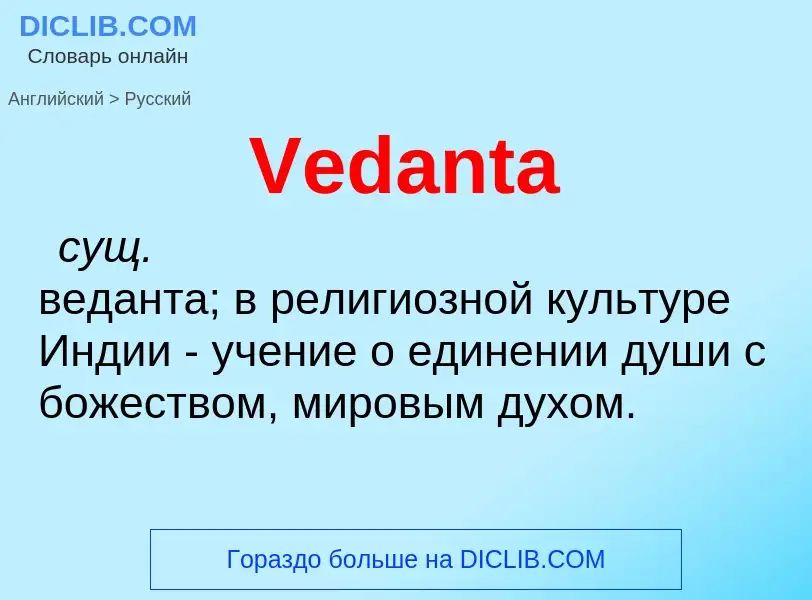Μετάφραση και ανάλυση λέξεων από την τεχνητή νοημοσύνη ChatGPT
Σε αυτήν τη σελίδα μπορείτε να λάβετε μια λεπτομερή ανάλυση μιας λέξης ή μιας φράσης, η οποία δημιουργήθηκε χρησιμοποιώντας το ChatGPT, την καλύτερη τεχνολογία τεχνητής νοημοσύνης μέχρι σήμερα:
- πώς χρησιμοποιείται η λέξη
- συχνότητα χρήσης
- χρησιμοποιείται πιο συχνά στον προφορικό ή γραπτό λόγο
- επιλογές μετάφρασης λέξεων
- παραδείγματα χρήσης (πολλές φράσεις με μετάφραση)
- ετυμολογία
Vedanta - translation to ρωσικά
[və|'dɑ:ntə-{və}'dæntə]
существительное
философия
веданта
[və|'dɑ:ntik-{və}'dæntik]
прилагательное
религия
ведийский
ведический
относящийся к ведам или веданте
Ορισμός
Βικιπαίδεια
Vedanta (; Sanskrit: वेदान्त, IAST: Vedānta), also known as Uttara Mīmāṃsā, is a Hindu philosophical tradition that is one of the six orthodox (āstika) schools of Hindu philosophy. The word "Vedanta" means "end of the Vedas", and encompasses the ideas that emerged from, or were aligned with, the speculations and enumerations contained in the Upanishads, with a focus on knowledge and liberation. Vedanta developed into many sub-traditions, all of which base their ideas on the authority of a common group of texts called the Prasthānatrayī , translated as "the three sources": the Upanishads, the Brahma Sutras and the Bhagavad Gita.
All Vedanta traditions contain extensive discussions on ontology, soteriology, and epistemology, even as there is much disagreement among the various schools. Independently considered, they may seem completely disparate due to the pronounced differences in thoughts and reasoning.
The main traditions of Vedanta are: Bhedabheda (difference and non-difference), Advaita (non-dualism), Vishishtadvaita (qualified non-dualism), Tattvavada (Dvaita) (dualism), and Suddhadvaita (pure non-dualism). Modern developments in Vedanta include Neo-Vedanta, and the philosophy of the Swaminarayan Sampradaya.
Most major Vedanta schools, except Advaita Vedanta and Neo-Vedanta, are related to Vaishnavism and emphasize devotion (Bhakti Yoga) to God, understood as being Vishnu or a related manifestation. Advaita Vedanta, on the other hand, emphasizes Jñana (knowledge) and Jñana Yoga over theistic devotion. While the monism of Advaita has attracted considerable attention in the West due to the influence of modern Hindus like Swami Vivekananda and Ramana Maharshi, most of the other Vedanta traditions focus on Vaishnava theology.





![Ramanujacharya depicted with Vaishnava [[Tilaka]] and Vishnu statue. Ramanujacharya depicted with Vaishnava [[Tilaka]] and Vishnu statue.](https://commons.wikimedia.org/wiki/Special:FilePath/Ramanuja embracing Lord Varadaraj.jpg?width=200)

